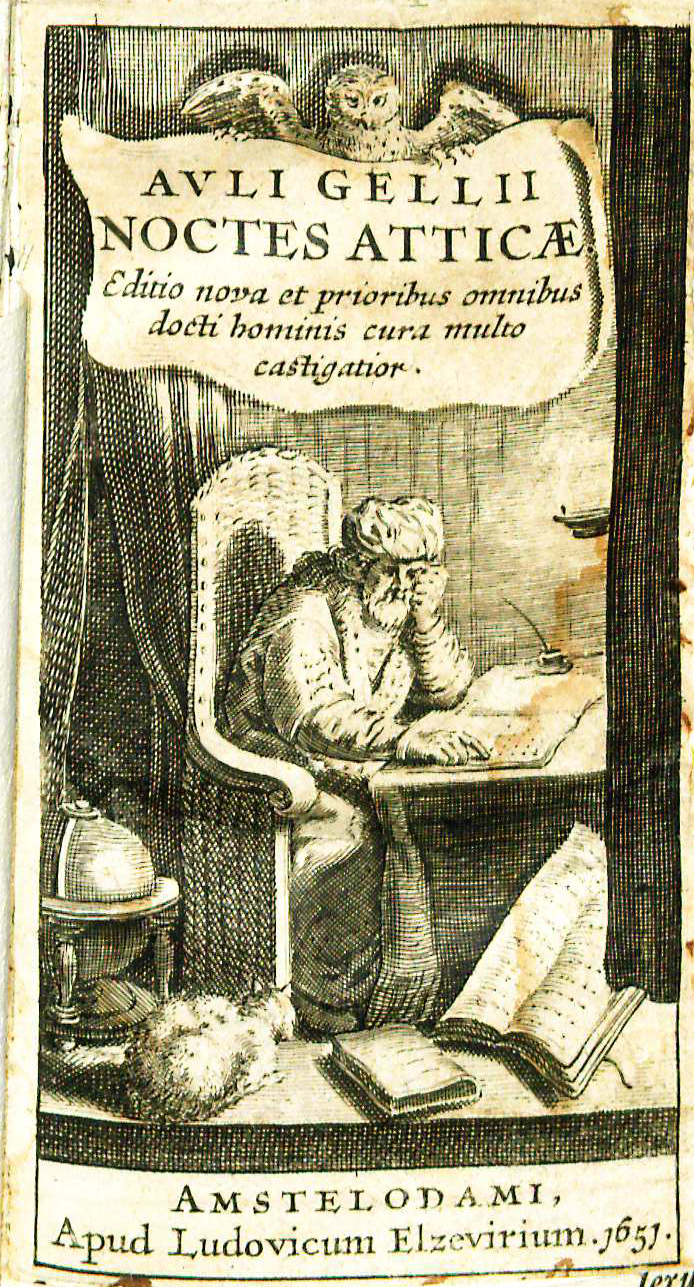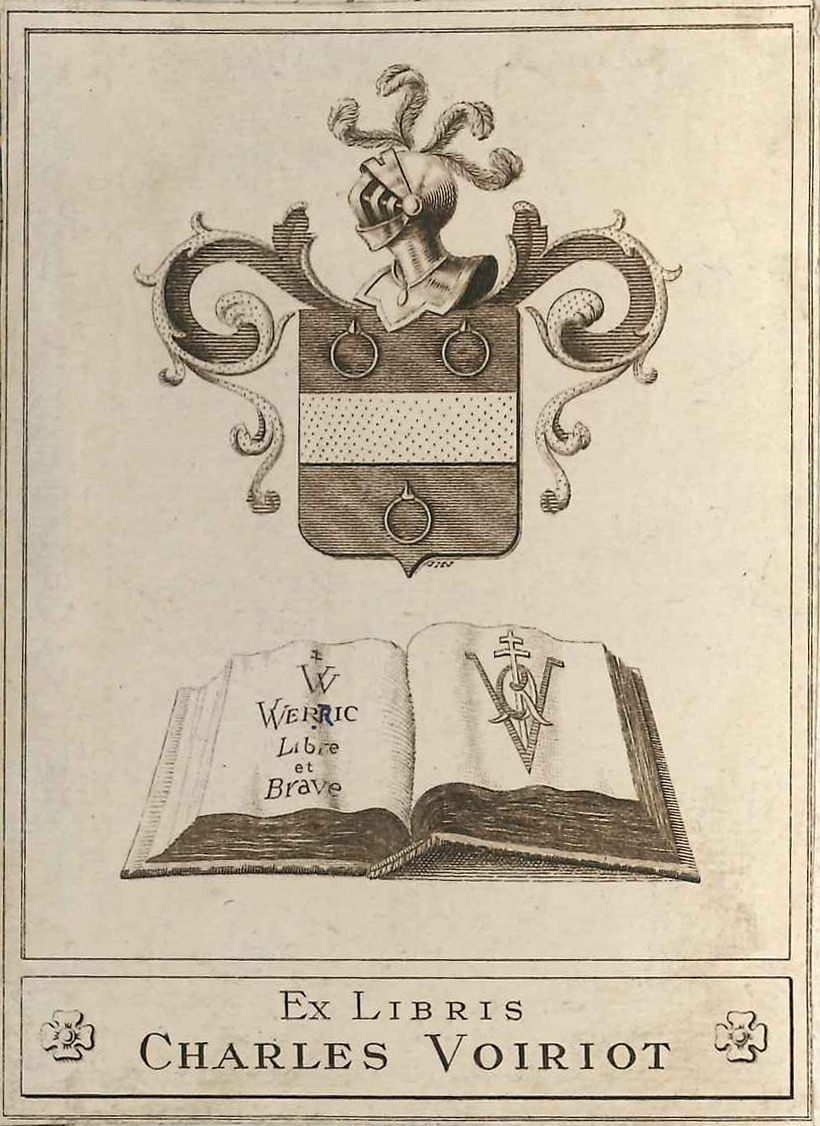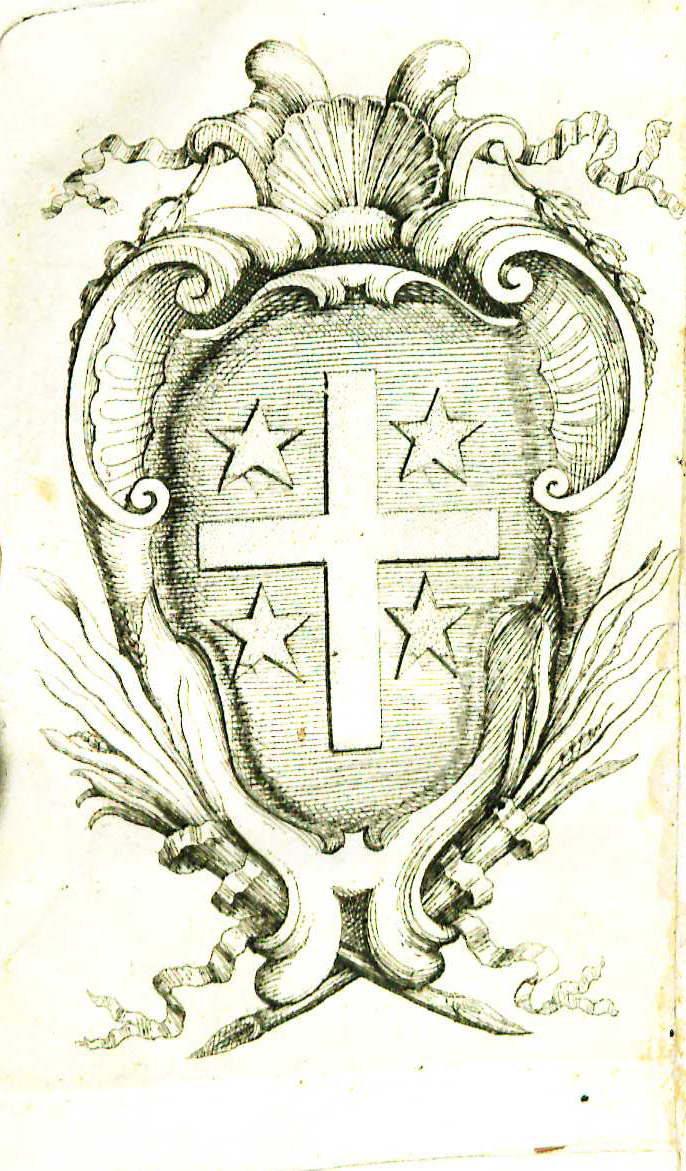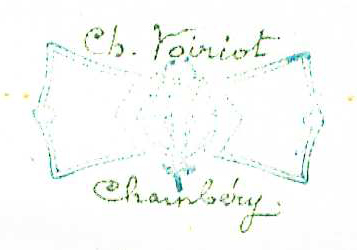Difference between revisions of "Auli Gellii Noctes Atticae"
| Line 15: | Line 15: | ||
|pages=[48], 498, [126] | |pages=[48], 498, [126] | ||
|desc=12mo (14 cm.) | |desc=12mo (14 cm.) | ||
| − | }} | + | }}{{BookPageBookplate |
| − | {{BookPageBookplate | ||
|imagename=AuliGelliNoctesAtticae1651BookplateFPD.jpg | |imagename=AuliGelliNoctesAtticae1651BookplateFPD.jpg | ||
|display=left | |display=left | ||
|caption=Bookplate of Charles Voiriot, front pastedown. | |caption=Bookplate of Charles Voiriot, front pastedown. | ||
| − | }}[http://en.wikipedia.org/wiki/Aulus_Gellius Aulus Gellius] (c. 125–after 180 CE) | + | }}[http://en.wikipedia.org/wiki/Aulus_Gellius Aulus Gellius] (c. 125–after 180 CE) was a Roman miscellanist. The only information remaining about him is from his own work, ''Attic Nights''.<ref>[http://www.oxfordreference.com/view/10.1093/acref/9780192801463.001.0001/acref-9780192801463-e-940 “Gellius, Aulus"] in ''Oxford Dictionary of the Classical World'', ed. by John Roberts (Oxford: Oxford University Press, 2007).</ref> He published the work around 180 CE, and it contains 20 books, from which are missing only the beginning of the preface, the end of Book 20, and Book 8 (though chapter headings remain).<ref>[http://www.oxfordreference.com/view/10.1093/acref/9780199548545.001.0001/acref-9780199548545-e-1352 “Ge'llius, Aulus”] in ''The Oxford Companion to Classical Literature'', ed. by M.C. Howatson (Oxford: Oxford University Press, 2011).</ref> He spent most of his life in Rome, though he spent a year in Athens for his education, from where he visited Claudius Atticus Herodes, attended the Pythian games and played the tourist.<ref>[http://www.oxfordreference.com/view/10.1093/acref/9780192801463.001.0001/acref-9780192801463-e-940 “Gellius, Aulus"] in ''Oxford Dictionary of the Classical World''.</ref> When he returned to Rome, he was appointed a judge of private cases, but was mostly interested in ancient law rather than modern practice.<ref>Ibid.</ref><br/> |
| − | + | <br/>Throughout the centuries, Gellius has been seen as “an ancient ''litteratus'' with whom [people have] a community of interests.”<ref>Charles N. Smiley, reviewer, “''The Attic Nights'' of Aulus Gellius by J. C. Rolfe” ''The Classical Journal'' 24, no. 4 (Jan. 1929): 295.</ref> He collected material throughout the winter nights in Attica and later arranged it for the “amusement and instruction of his children."<ref>[http://www.oxfordreference.com/view/10.1093/acref/9780199548545.001.0001/acref-9780199548545-e-1352 “Ge'llius, Aulus”] in ''The Oxford Companion to Classical Literature''.</ref> In his compilation of Greek and Roman writing, Gellius “quotes and discusses portions of some two hundred and seventy-five ancient authors” including more than eighty passages from Cicero, sixty difficult sentences from Virgil, and choice information about Julius Caesar.<ref>Charles N. Smiley, 295.</ref> The thousands of passages contained in his work make Gellius a valuable source for much early Latin literature that is not extant.<ref>[http://www.oxfordreference.com/view/10.1093/acref/9780199548545.001.0001/acref-9780199548545-e-1352 “Ge'llius, Aulus”] in ''The Oxford Companion to Classical Literature''.</ref> | |
| − | <br/>Throughout the centuries, Gellius has been seen as “an ancient ''litteratus'' with whom [people have] a community of interests.”<ref>Charles N. Smiley, reviewer, “''The Attic Nights'' of Aulus Gellius by J. C. Rolfe” ''The Classical Journal'' 24, no. 4 (Jan. 1929): 295.</ref> He collected material throughout the winter nights in Attica and later arranged it for the “amusement and instruction of his children."<ref>[http://www.oxfordreference.com/view/10.1093/acref/9780199548545.001.0001/acref-9780199548545-e-1352 “Ge'llius, Aulus”] in ''The Oxford Companion to Classical Literature''.</ref> In his compilation of Greek and Roman writing, Gellius “quotes and discusses portions of some two hundred and seventy-five ancient authors” including more than eighty passages from Cicero, sixty difficult sentences from Virgil, and choice information about Julius Caesar.<ref>Smiley, 295.</ref> The thousands of passages contained in his work make Gellius a valuable source for much early Latin literature that is not extant.<ref>[http://www.oxfordreference.com/view/10.1093/acref/9780199548545.001.0001/acref-9780199548545-e-1352 “Ge'llius, Aulus”] in ''The Oxford Companion to Classical Literature''.</ref> | ||
==Evidence for Inclusion in Wythe's Library== | ==Evidence for Inclusion in Wythe's Library== | ||
Revision as of 15:08, 27 March 2014
by Aulus Gellius
| Auli Gellii Noctes Atticae | |
|
Title page from Auli Gellii Noctes Atticae, George Wythe Collection, Wolf Law Library, College of William & Mary. | |
| Author | Aulus Gellius |
| Editor | Joannes Fredericus Gronovius |
| Published | Amstelodami: Apud Ludovicum Elzevirium |
| Date | 1651 |
| Edition | Editio nova et prioribus omnibus docti hominis cura multo castigatior |
| Language | Latin |
| Pages | [48], 498, [126] |
| Desc. | 12mo (14 cm.) |
Aulus Gellius (c. 125–after 180 CE) was a Roman miscellanist. The only information remaining about him is from his own work, Attic Nights.[1] He published the work around 180 CE, and it contains 20 books, from which are missing only the beginning of the preface, the end of Book 20, and Book 8 (though chapter headings remain).[2] He spent most of his life in Rome, though he spent a year in Athens for his education, from where he visited Claudius Atticus Herodes, attended the Pythian games and played the tourist.[3] When he returned to Rome, he was appointed a judge of private cases, but was mostly interested in ancient law rather than modern practice.[4]
Throughout the centuries, Gellius has been seen as “an ancient litteratus with whom [people have] a community of interests.”[5] He collected material throughout the winter nights in Attica and later arranged it for the “amusement and instruction of his children."[6] In his compilation of Greek and Roman writing, Gellius “quotes and discusses portions of some two hundred and seventy-five ancient authors” including more than eighty passages from Cicero, sixty difficult sentences from Virgil, and choice information about Julius Caesar.[7] The thousands of passages contained in his work make Gellius a valuable source for much early Latin literature that is not extant.[8]
Evidence for Inclusion in Wythe's Library
Listed in the Jefferson Inventory of Wythe's Library as "Auli Gellii noctes Atticae. p.f." and given by Thomas Jefferson to his grandson Thomas Jefferson Randolph. The precise edition owned by Wythe is unknown. George Wythe's Library[9] on LibraryThing indicates this, adding "Probably a portion of the work only." The Brown Bibliography[10] lists the quarto edition published in Leiden in 1706 based on the copy Jefferson sold to the Library of Congress.[11] Brown also mentions a second Jefferson copy—one in duodecimo, published in Amsterdam in 1651—sold by his grandson, Francis Eppes in 1873. This copy matches Jefferson's Wythe inventory designation of "p.f." (by which he always meant a size smaller than octavo) better than the quarto version sold to the Library of Congress. The Wolf Law Library purchased a copy of the 1651 Amsterdam edition.
Description of the Wolf Law Library's copy
Bound in quarter calf with marbled boards. Spines feature gilt bands and decoration and a black morocco label with gilt lettering. Includes the armorial bookplate of Charles Voiriot with the French motto "Libre et Brave" (Free and brave) on the front pastedown and an unsigned bookplate on the title page verso. Stamped on the front free endpaper with "Ch. Voiroit" written above and "Chambery" written below the stamp. Purchased from Liseronsblancs.
Find this book in the William & Mary's online catalog.
References
- ↑ “Gellius, Aulus" in Oxford Dictionary of the Classical World, ed. by John Roberts (Oxford: Oxford University Press, 2007).
- ↑ “Ge'llius, Aulus” in The Oxford Companion to Classical Literature, ed. by M.C. Howatson (Oxford: Oxford University Press, 2011).
- ↑ “Gellius, Aulus" in Oxford Dictionary of the Classical World.
- ↑ Ibid.
- ↑ Charles N. Smiley, reviewer, “The Attic Nights of Aulus Gellius by J. C. Rolfe” The Classical Journal 24, no. 4 (Jan. 1929): 295.
- ↑ “Ge'llius, Aulus” in The Oxford Companion to Classical Literature.
- ↑ Charles N. Smiley, 295.
- ↑ “Ge'llius, Aulus” in The Oxford Companion to Classical Literature.
- ↑ LibraryThing, s. v. "Member: George Wythe" accessed on February 28, 2014.
- ↑ Bennie Brown, "The Library of George Wythe of Williamsburg and Richmond," (unpublished manuscript, May, 2012) Microsoft Word file. Earlier edition available at: https://digitalarchive.wm.edu/handle/10288/13433
- ↑ E. Millicent Sowerby, Catalogue of the Library of Thomas Jefferson, 2nd ed. (Charlottesville: University Press of Virginia, 1983), 5:161 [no.4905].



